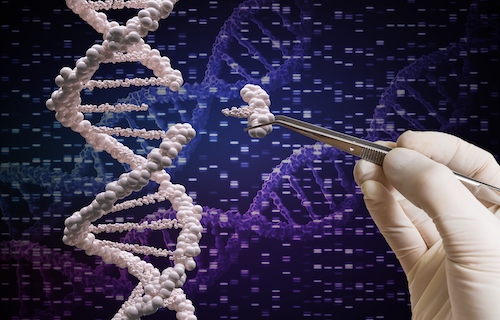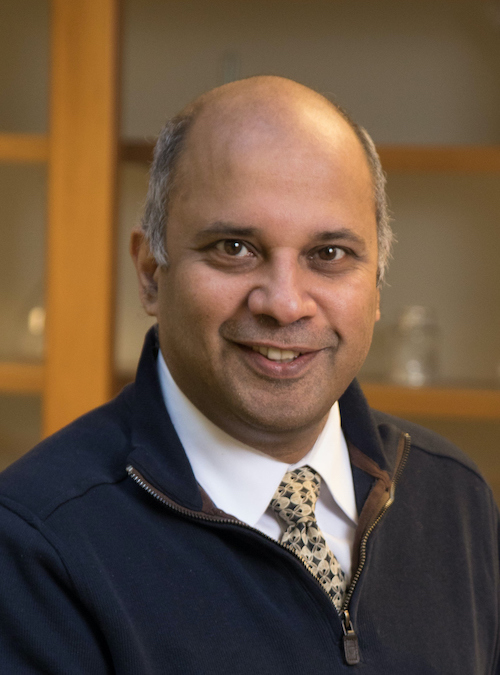
New Brunswick, N.J., September 9, 2020 – With the aid of a $3.1 million, five-year National Institutes of Health grant (R01CA243547), Rutgers Cancer Institute of New Jersey leaders Eileen White, PhD, Edmund Lattime, PhD, and Shridar Ganesan, MD, PhD, will collaborate on translational research exploring the immune response to cancers that feature a high number of mutations.
Immunotherapy drugs known as ‘checkpoint inhibitors’ that manipulate parts of the human immune system to attack targeted cancer mutations, have become an important cornerstone in the treatment of cancer over the past decade. Despite durable responses seen in a number of cancers with this class of drugs, only 25 to 30 percent of human tumors with mutations respond to this therapy. Through this work, Drs. White, Lattime and Ganesan, who are principal investigators on the award, aim to develop a better understanding of how mutation burden affects the immune response to solid tumors.
The team is building on research from a 2014 clinical trial led by the Phase 1/Investigational Therapeutics Program at Rutgers Cancer Institute. Given an unexpected, rapid and durable response to a checkpoint inhibitor drug for endometrial cancer, the team enlisted the Precision Medicine Program, led by Ganesan, chief of molecular oncology and associate director for translational research, to conduct genomic analysis of the tumor. They zeroed in on a mutation in polymerase epsilon – or POLE – which inactivates the proofreading activity that corrects mistakes in DNA replication leading to a high burden of DNA mutations. This high mutation burden may stimulate the immune system, making cancers with POLE mutations vulnerable to immunotherapy.

From left to right: Eileen White, PhD, Edmund Lattime, PhD, and Shridar Ganesan, MD, PhD
For this project, investigators will explore the impact that POLE and a related gene, polymerase delta 1 (POLD1) proofreading mutations have on tumors using novel mouse models developed by White. These models generate tumors with both high and low mutation burden to examine how the level of mutations in a tumor alter the anti-tumor immune response and if and how this promotes response to checkpoint inhibitors.
Using these models, Lattime, associate director for education and training at Rutgers Cancer Institute, will examine immune regulatory pathways of tumor suppression, while Rutgers Cancer Institute researcher Shin-Heng Chiou, PhD, assistant professor of medicine at Rutgers Robert Wood Johnson Medical School, will explore immune cell recognition. They’ll compare how specific oncogenes induce tumors in this model to determine if these mutations alter tumor growth, local and systemic immune response, and response to immune checkpoint therapy.
“These unique models enable us to study an anti-tumor immune response to further elucidate why some 75 percent of patients have cancers that don’t respond to checkpoint inhibitor treatment and how we can make them responsive,” notes White, who is deputy director, chief scientific officer and associate director for basic research at Rutgers Cancer Institute and a distinguished professor of molecular biology and biochemistry at Rutgers School of Arts and Sciences.
“If we can determine what immune mechanisms are altered, we can better inform treatment protocols by determining if patients may have a better response to combining two checkpoint inhibitors or combining a checkpoint inhibitor with another form of therapy,” shares Ganesan, who is also the Omar Boraie Chair in Genomic Science at Rutgers Cancer Institute and professor of medicine and pharmacology at Rutgers Robert Wood Johnson Medical School. “The results of this work can enable us to rapidly move these approaches to phase 1 clinical trials and develop additional treatment combination studies.”
Investigators also aim to identify biomarkers of response, which are critically needed so patients can be directed to the most effective and least toxic treatment. “Twenty percent of patients on checkpoint inhibitors develop immune-related adverse events. Identifying biomarkers that can determine who is predisposed to autoimmune responses could also help determine the best treatment course leading to improved outcomes,” adds Lattime, who is also a professor of surgery and a professor of biochemistry and molecular biology at Rutgers Robert Wood Johnson Medical School.
The impact of the work supported by this grant helped to inspire philanthropic support and inform the launch of the Cancer Immunology and Metabolism Center of Excellence at Rutgers Cancer Institute of New Jersey. The center will foster investigation into these disciplines to accelerate and translate laboratory discoveries into clinical treatments through more effective and efficiently designed clinical trials.
About Rutgers Cancer Institute of New Jersey
As New Jersey’s only National Cancer Institute-designated Comprehensive Cancer Center, Rutgers Cancer Institute, together with RWJBarnabas Health, offers the most advanced cancer treatment options including bone marrow transplantation, proton therapy, CAR T-cell therapy and complex surgical procedures. Along with clinical trials and novel therapeutics such as precision medicine and immunotherapy – many of which are not widely available – patients have access to these cutting-edge therapies at Rutgers Cancer Institute of New Jersey in New Brunswick, Rutgers Cancer Institute of New Jersey at University Hospital in Newark, as well as through RWJBarnabas Health facilities. To make a tax-deductible gift to support the Cancer Institute of New Jersey, call 848-932-8013 or visit www.cinj.org/giving.
###
For journalists – contact:
Michele Fisher
Associate Director, Marketing and Communications
732-235-9872
michele.fisher@rutgers.edu
For patient appointments/inquiries – contact:
844-CANCERNJ (844-226-2376)



